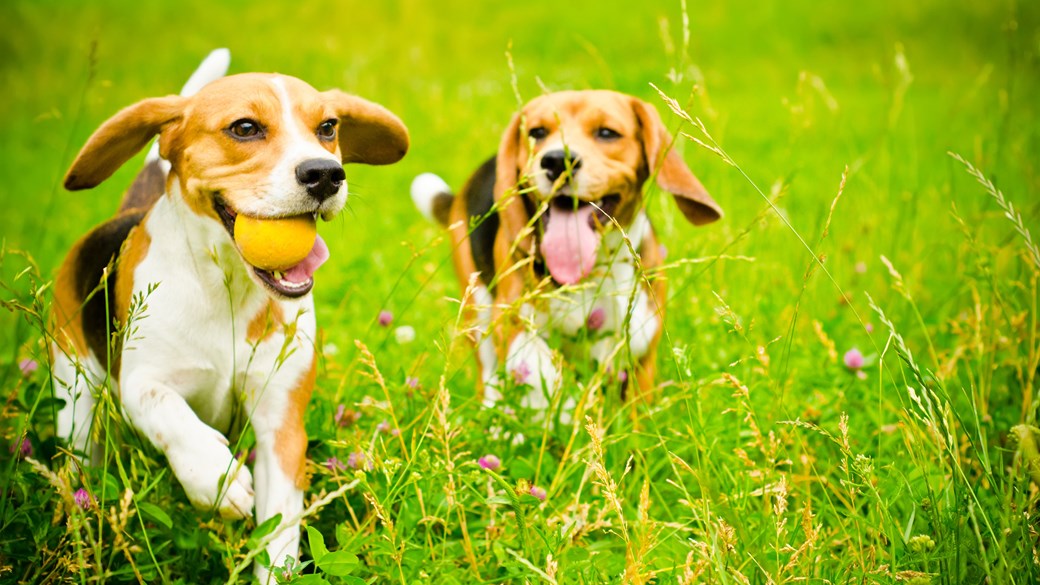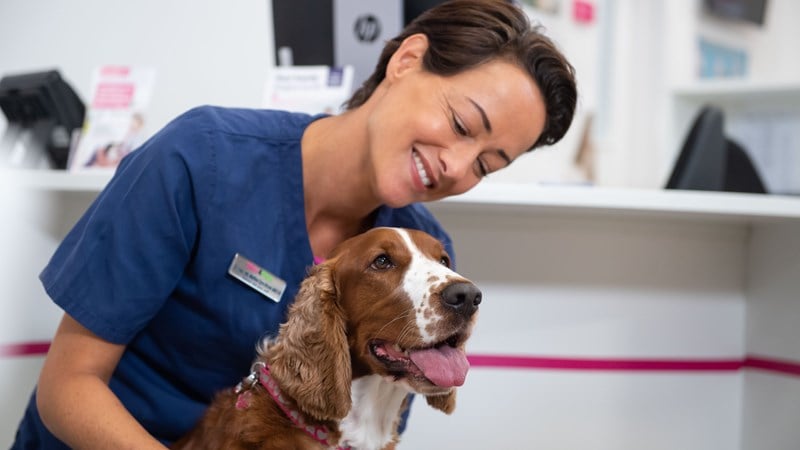
Introducing Dogs
A careful introduction, and a bit of pre-planning, can help those first few moments and days go smoothly and set your pups up for a lifetime of friendship!
Bringing home your new puppy is a really exciting time, but if you already have a dog at home you may be concerned that they won’t share your joy at your new arrival.
Read about choosing the right dog or puppy Find your local practiceMore about introducing dogs
Getting the home environment right before you bring home your new puppy is really important. Keeping anything that could spark conflict to a minimum is the aim of the game, as well as making sure everyone has their own personal space:
- Remove your current dog's favourite toys for the time being so that your new addition doesn't try to have fun with them.
- Make sure both dogs have their own food bowls and keep them apart.
- Make sure your current dog has a space they can escape to, with their own things and scent. If your current dog is crate trained, it is especially important that this remains a safe space.
- Get a new crate for your new dog. never expect dogs to share a crate.
- Make sure any vaccinations, flea and worm treatments are up-to-date for both dogs. if you are getting a puppy they may not have started or completed their vaccinations yet, but get them booked in with your local Vets4Pets as soon as you can.
Our Best Start In Life health plan is a great way to make sure your new pup has everything they need!
Keep your initial introduction controlled – popping your two dogs together and hoping for the best could get them off on the wrong foot, and in rarer cases could even lead to injury especially when introducing two adult dogs.
- There's no rush. Slow and steady wins the race where introductions are concerned, so don't feel pressured to turn your dogs into best friends on day one.
- Keep calm. You may be nervous about how a meeting with go, but try and stay outwardly calm. Your dogs will pick up on your mood, and use you as a cue for how to feel about a new situation.
- Go walkies. If you have two adult dogs, just walking them in the same place can be a great way to start. Keep relatively far apart at first, so they don't interact but are aware of each other. If this seems to be going well, you can introduce them, but keep it short and sweet and end on a high note! This won't be an option with young puppies, who need to wait for several weeks after their pet Vaccinations before they are safe to visit places like parks.
- Meet at home. It can be easiest for dogs in meet in the yard or garden if you have one, as this space is a little more neutral than busier areas such as the kitchen or lounge and your dog may feel less territorial over the outside spaces. Keeping both dogs on a loose lead will help you keep control, while stopping them from feeling restricted. Don't hold either of the dogs in your arms during the introduction.
- Keep dogs separate while you are out for a while.
- Reward good behaviour If your dogs are sniffing each other, interacting positively, or even just quietly getting on with their days, make sure to reward that behaviour with treats and praise.
Like any relationship, there is an element of time, so it’s important to take that into consideration.
- When together always supervise your dogs for several weeks after the initial introductions.
- Keep your older dog in their routine as much as possible, so they don't feel unsettled by any more changes.
- Keep an eye on both dogs body language. If you have a young puppy, they may not be able to read an adult dog very well yet, and if you are introducing two adult dogs it's important to spot signs of discomfort or anxiety early on, before any more aggressive displays.
- Don't allow play to get out of hand this means not letting your older dog tell off your puppy, in case fear or anxiety develops, but also not letting your puppy jump all over your older dog as they may believe this is acceptable behaviour with all dogs.
- Keep play sessions short and sweet.
- Ensure play is balanced both dogs should have turns in chasing/being on top and other play behaviours
- If you aren't sure if both dogs are enjoying the play, interrupt play and hold onto both dogs. Let go of the dog you are not sure is enjoying themselves if they head over for more, you're okay, but if they don't it is time to give both dogs some space. This is called a consent test
- Regularly interrupt play and ask for cues, such as sit or down which can help keep play measured and in control.
Health Plans to keep your dog healthy
At Vets4Pets we offer a range of Health Plans that make essential routine treatments more affordable. You'll save money on things like annual vaccinations, flea and worm treatment and routine health check-ups.

Dog Advice
Read more of our expert dog advice to keep your dog happy and healthy.
